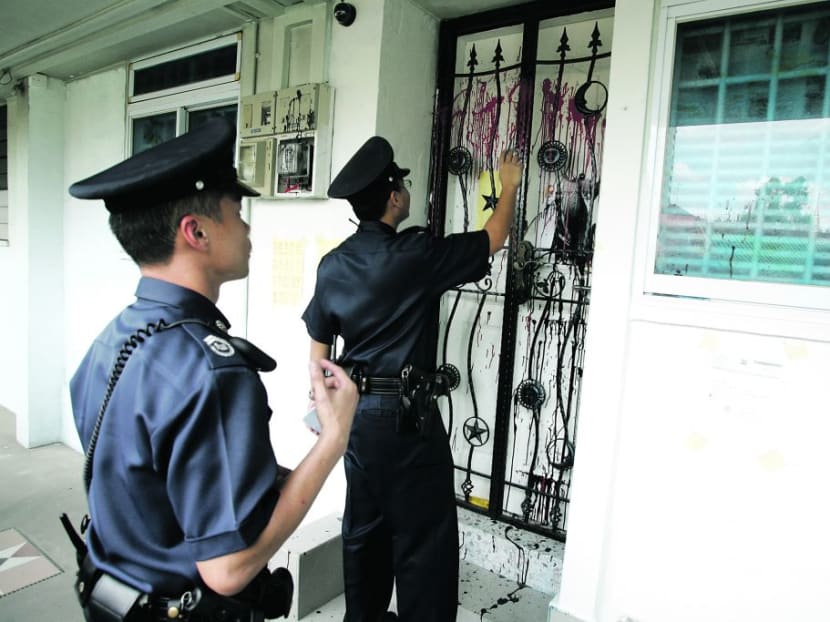Loansharks turning to harassment via electronic means: Police
SINGAPORE — After hitting a 10-year low in 2016, the number of unlicensed moneylending harassment cases shot up again last year, driven by a sharp spike in incidents involving electronic harassment.

Police say its tough enforcement efforts to disrupt the operations of unlicensed moneylending have forced loanshark harassers to shift to “non-damage and non-confrontational tactics” using electronic means instead of damaging property. TODAY file photo
SINGAPORE — After hitting a 10-year low in 2016, the number of unlicensed moneylending harassment cases shot up again last year, driven by a sharp spike in incidents involving electronic harassment.
Releasing its annual crime statistics on Saturday (Feb 3), the police said there were a total of 3,806 unlicensed moneylending harassment cases last year, up 12 per cent from the previous year.
This was despite a 22 per cent drop in the number of cases involving property damage — like paint splashed on doors — from 1,308 to 1,023 cases.
Noting that such cases have been declining since 2012, police said that its “relentless enforcement efforts to disrupt the operations” of loansharks, along with strong partnerships with the community and the introduction of more police cameras in the neighbourhoods, have forced the harassers to shift to “non-damage and non-confrontational tactics.”
There were 2,783 such harassment cases - via text messages and through social media - reported last year, an increase of 33.8 per cent from 2016.
“The proliferation of new communication platforms and high usage of mobile devices have made it easier for harassers to conduct their harassment via electronic means, as well as target larger groups simultaneously,” the police said.
It added that it will work with other stakeholders such as the Infocomm Media Development Authority to crack down on such tactics. It is also urging members of the public who receive such harassment messages and calls to block them, and report them to the authorities.
In its annual crime statistics on Saturday, the police said that while overall crime in Singapore dropped in 2017, molest cases and scams, particularly internet love scams and e-commerce scams, remain areas of concern. Internet love scams hit a new high last year, with the number of cases spiking one third and amounts cheated going up by 50 per cent.
In 2017, internet love scams hit a record 825 cases, compared to 635 the year before, registering an increase of nearly 30 per cent. The amount cheated – at S$37 million – also set a new high, a spike of 54 per cent from 2016’s S$24 million.
A new record was also set for the amount cheated in a single case, with one victim fleeced of S$6 million by an online Casanova.
Although the number of e-commerce scams dipped last year, this category still made up a significant number of cases among scams, said the police. Cases reported went down 8.4 per cent to hit 1,961 last year, and the amounts cheated similarly registered a 6.7 per cent decrease to S$1.4 million.
Another area of concern is the rise in the number of molest cases, particularly on public transport and entertainment nightspots. The number of molest cases climbed 22.2 per cent to 1,566 last year. On public transport, outrage of modesty cases notched an increase of 60.5 per cent, to hit 207 cases last year. In 2016, 129 cases were reported.
At entertainment nightspots, 107 cases were reported last year, representing a 33.8 per cent increase from the year before. The spike has led to the number of crimes against persons, which includes outrage of modesty, rising 4 per cent, with 4,527 cases reported last year. To this end, patrols and outreach efforts will be stepped up, said the police.
“The police will be enhancing our presence at public transportation nodes through stepped-up patrols by our Transport Security Command officers,” it said on Saturday.
At entertainment nightspots, it is working with the operators on crime prevention measures, like the installation of surveillance cameras.
Despite the areas of concern, the overall crime rate in Republic remained low and the Republic remains one of the safest cities in the world, the police said.
The total number of reported cases dipped by around 1 per cent, from 2016’s 33,099 to 32,773 last year.
When broken into categories, certain crimes notched historic lows — theft and related crimes dropped 4.4 per cent to 13,495 cases last year, whereas violent and serious property crimes dipped 12.4 per cent to 218 cases.
Robbery, housebreaking, snatch theft, and motor vehicle and related thefts, also hit all-time lows last year.
However, crimes related to housebreaking went up to 328 cases last year, registering a 9.3 per cent increase from 2016’s 300 cases. The police said the spike was mainly due to an increase in cases of people being in possession of housebreaking equipment.
Among scams, the police noted drops in credit-for-sex scams (a decrease of 46.3 per cent to 418 cases), as well as China officials impersonation scams, an area that it had flagged in 2016’s annual crime brief.
Some categories, such as commercial crimes – including scams and other white collar crimes – grew by 1.8 per cent, to hit 8,566 cases last year.






